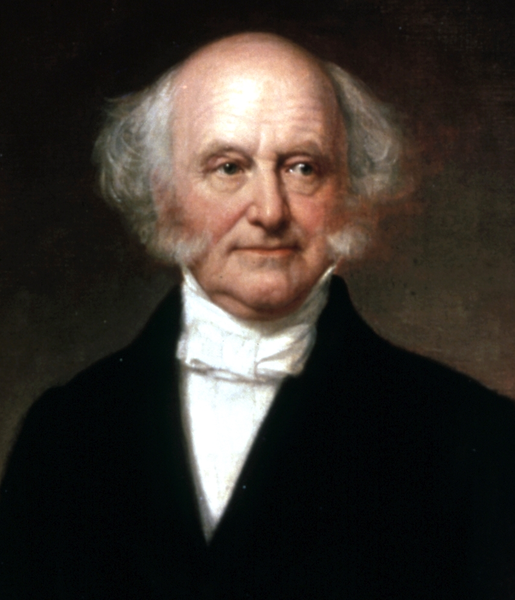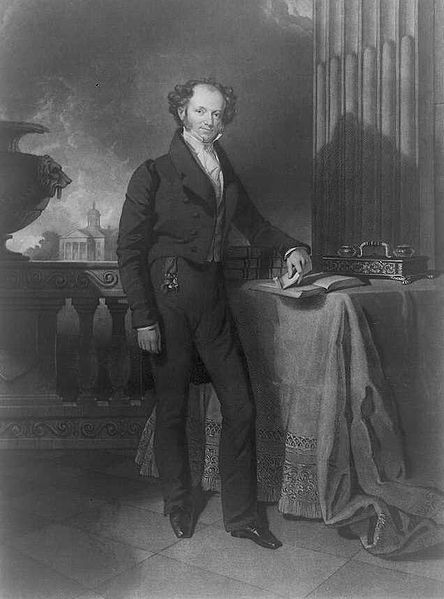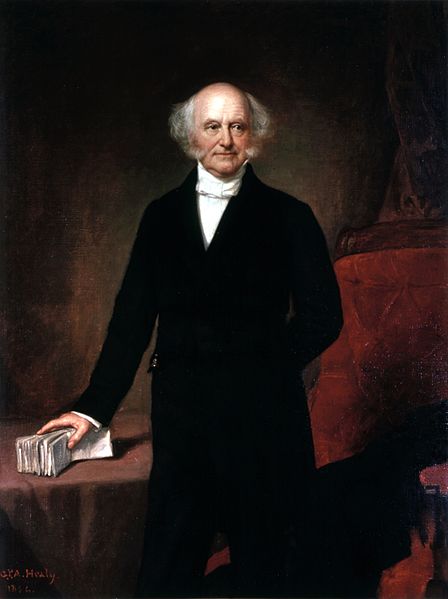| Martin Van Buren | |
|---|---|
 |
|
| 8th United States President « Previous Next » |
|
| In office | Mar. 4, 1837 – Mar. 4, 1841 |
| V. President | Richard Johnson |
| Political Party | Free Soil Party (1848–1854), Democratic Party (1828–1848), Democratic-Republican Party (Before 1825) |
| Personal Info | |
| Born | Dec. 5, 1782 |
| Died | July 24, 1862 (at age 79) |
| Religion | Dutch Reformed |
| Profession | Lawyer |
| Signature | |
| Wife | Hannah Hoes (1807–1819) |
| Children | Abraham, John, Martin, Smith |
| U.S. Presidents 1-15 | |
| 1. George Washington (1789–1797) | |
| 2. John Adams (1797-1801) | |
| 3. Thomas Jefferson (1801-1809) | |
| 4. James Madison (1809-1817) | |
| 5. James Monroe (1817-1825) | |
| 6. John Quincy Adams (1825-1829) | |
| 7. Andrew Jackson (1829-1837) | |
| 8. Martin Van Buren (1837-1841) | |
| 9. William Henry Harrison (1841-1841) | |
| 10. John Tyler (1841-1845) | |
| 11. James Knox Polk (1845-1849) | |
| 12. Zachary Taylor (1849-1850) | |
| 13. Millard Fillmore (1850-1853) | |
| 14. Franklin Pierce (1853-1857) | |
| 15. James Buchanan (1857-1861) | |
| List of All the Presidents |
President Martin Van Buren started his illustrious career as a lawyer and used this as his stepping stone towards the attainment of his political ambitions. Van Buren and his colleagues organized the now dominant Democratic Party which helped him win the Presidential seat to become the 8th President of the United States of America. It seems like Van Buren is fated to be tied with the number eight because he was the 8th U.S. Vice President before he became the 8th U.S. President.
Early Contribution to Politics
Martin Van Buren’s parents were of Dutch decent and English was not his first language. His only advantage was that he was born in America and became a U.S. citizen. Van Buren took the Senate U.S. post in 1821, representing the New York state and introduced a lot of improvements to the system like repair of various roads and the making of canals. These undertakings proved to be an asset, and a greater portion of the United States became content with the government’s rule.
Martin Van Buren became the United States Secretary after President Jackson was elected into office. This was a great opportunity for Van Buren who began to cultivate his close ties with key persons in government. He skillfully made allies in Washington and at the same time became the President’s trusted confidant. Some people find this kind of relationship astonishing, because the two political icons had different ideologies and they were not always in agreement.
Presidency
President Jackson served for two terms and Van Buren was his Vice President during his second term. During the 1836 Presidential elections, Van Buren’s slogan was to carry out the same policies which were implemented by Andrew Jackson. People regarded that this campaign was quite a show and it boosted Van Buren’s candidacy straight to the Presidential seat. Although Van Buren won, it was very unfortunate that the U.S. economy experienced slow-down during his time in office.
Historians termed the early rule of Van Buren as the “Panic of 1837” where instead of a booming nation; the United States experienced the worst kind of economic depression. This economic turmoil greatly affected the President’s focus and the immediate resolution of the problem became his main agenda. The United States was a very young nation at that time and Van Buren needed to come up with an effective way to turn the tides in favor of his country.
The President’s idea that the money of the U.S. should be deposited with an independent treasury caused some debates and political disturbance but the said proposition was later made into law in the summer of 1840. Martin Van Buren refused to support the State Banks because he had the notion that the said economic crises started with this type of monetary control. If the federal government will have its funds handled by an independent office, the money will be taken cared of properly.
 Another issue which could have rocked the Van Buren leadership was the rift between the United States and Great Britain concerning authority over a border which is located between U.S. and Canada. The British and Canadian government started to call for war but Van Buren stopped the turmoil and turned a deaf ear towards the two countries’ call for battle. President Martin Van Buren is a peaceful leader and he continued to resolve the burning issue through various channels of peaceful negotiations.
Another issue which could have rocked the Van Buren leadership was the rift between the United States and Great Britain concerning authority over a border which is located between U.S. and Canada. The British and Canadian government started to call for war but Van Buren stopped the turmoil and turned a deaf ear towards the two countries’ call for battle. President Martin Van Buren is a peaceful leader and he continued to resolve the burning issue through various channels of peaceful negotiations.
Not all people were happy with the President’s decision especially those who wanted to give an aggressive response to Great Britain and Canada. The leadership of President Martin Van Buren was greatly criticized by many because of the unstable economic condition of the country and his failure to answer his countrymen’s call for war against Great Britain and Canada. During his re-election bid, he suffered a great loss against the Whig Party lead by William Henry Harrison.
Important Contributions to U.S. Political History
It was because of President Van Buren why the now popular Democratic Party was established in the first place. In addition to this, he also played a very special role in the creation of the two-party system where it was necessary for one political party, in this case the Democratic Party, to compete with a challenger party which at that time was the Whig Party. The President did not believe that a single political party system would be effective. This was because he wanted to maintain a system of checks and balances and to avoid the concentration of power within a single United States political party.
Martin Van Buren had a very long political career. He was merely 17 years old when started campaigning for political nominees. During his early political career as a campaigner for Jackson, Van Buren wanted to unify the old Republican group and this set-up became beneficial for Jackson’s career. It was Van Buren’s idea to have a perfect and formidable organization which can eventually elect an individual into office. Van Buren made sure that his speeches were carefully delivered and that it would leave an impact even on deaf ears.
The charming wits and ideological beliefs of Martin Van Buren did not help his career and his political adversaries even continuously hound him with intrigue, pragmatism and indecisiveness. Needless to say, few people really helped Martin Van Buren during his 4 years stay as the United States President. If you closely study history, President Van Buren’s foreign policy revolved around central administration and this was really effective, as opposed to concentrating on warfare and destructive leadership.
 Few people during Van Buren’s time understood the real meaning of peace and neutrality. President Van Buren was trained during the past administration as an instrument of peace and concerted efforts towards open negotiation. In fact, he played a key role for open trade between the United States and the West British Indians during the term of President Jackson. This was a far-fetched goal during that time but Van Buren made it possible to achieve this objective.
Few people during Van Buren’s time understood the real meaning of peace and neutrality. President Van Buren was trained during the past administration as an instrument of peace and concerted efforts towards open negotiation. In fact, he played a key role for open trade between the United States and the West British Indians during the term of President Jackson. This was a far-fetched goal during that time but Van Buren made it possible to achieve this objective.
When Van Buren was Vice President to President Jackson, the President lost his temper and almost caused a great war with France. It was Van Buren who resolved the issue through his ability to settle the matter through an amicable settlement. Historians believe Martin Van Buren to be a perfect epitome of a peaceful and honest President. However, people during his time were more into war and conflict. In addition to this, those were the times when having a vast territory for a country was an advantageous factor and the people believed that President Van Buren should have declared a war and made an example out of Great Britain and Canada.
The Little Magician, as President Martin Van Buren was called, had a great yearning for pleasant relationship between countries and he devised a way to make peace with the Mexican government. There were claims made by the United States government during his time and because of open communication between the two countries, the Mexican government allowed the arbitration of the said claims. President Martin Van Buren was a man of principle and diplomatic skill. It is a pity that the people during his time did not understand the importance of his role in the U.S. political history.